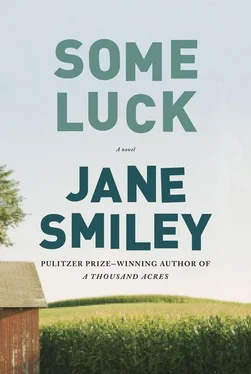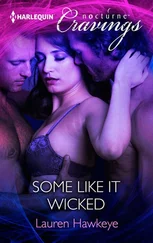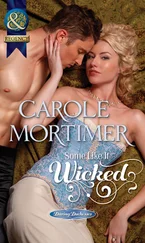As well dressed as she was, she fit into the front room of the farm. She relaxed against the back of the sofa. She ran her hand over Rosanna’s afghan, she admired the view out the windows, she said that the corn was as high as she’d ever seen it.
“You mean prices, right?” said Walter, and she nodded. When Frank carried her bag up to Lillian’s old room, she did not recoil at the endless pink, but said, “How cute!” She admired Henry’s bookshelves and said, “Name one that you really want.”
Henry said, “ Illusions perdues . In French.”
“I’m sure that’s expensive,” said Rosanna.
“They always are,” said Frank.
But they loved her. They considered her a prize. Frank watched as she deployed her charms, knowing every moment that he himself was the prize, as far as Andy was concerned. It was not only that he was flattered and entertained, though — he was also fascinated and seduced. Women were supposed to be mysterious, and most of the girls he knew did their best, but Andy truly was mysterious, in the way that only someone you had once known as a girl and now knew as a woman could be; he missed what she had been, and therefore loved it, and he marveled at what she had become, and so loved that as well.
ROSANNA COULD NOT HAVE SAID that she enjoyed making Thanksgiving dinner for twenty-three people (a turkey, a standing rib roast, and a duck that Granny Mary brought; ten pounds of mashed potatoes, and that not enough; five pies; sweet potatoes; more stuffing than could be stuffed; all the Brussels sprouts left in the garden, though they were good after the frost). She could not say that Lillian had control of those children, who were underfoot every time you took a step, though they were good-natured, to be sure. Henry scrutinized the dishes of food as though he were being asked to partake of roadkill, at least until the pies were served, and Claire burst into tears for no reason at all, but when they all had their plates in front of them, and a few deep breaths were taken, and first Andrea, and then Granny Elizabeth, and then Eloise said, “This looks delicious,” she began to have a strange feeling. She should have sat down — Joe, who was sitting beside her, moved her chair in a bit — but she didn’t want to sit down, or eat, at all (what with tasting everything, she wasn’t hungry); she just wanted to stand there and look at them as they passed the two gravy boats and began to cut their food. It couldn’t have happened, she thought. They couldn’t have survived so many strange events. Take your pick — the birth of Henry in that room over there, with the wind howling and the dirt blowing in and her barely able to find a rag to wipe the baby’s mouth and nose. Take your pick — all of them nearly dying of the heat that summer of ’36. Take your pick — Joey falling out of the hayloft, Frankie driving the car to Usherton, Frankie disappearing into the Italian Campaign, Frankie, for Heaven’s sake, living in a tent all through college. Take your pick — Walter falling into the well (yes, she had gotten that out of him one day during the war, when he said, “Remember when I fell into the well?” and she said, “What in the world are you talking about?” and he blushed like a girl). Take your pick — Granny Mary with her cancer, but still walking around. Take your pick — Lillian running off with a stranger who turned out to be a clown, but a lovable one, and nice-looking, and weren’t Timmy and Debbie just darling? Normally, Rosanna took credit for everything, good and bad (her eye flicked to the doorway, the very spot where Mary Elizabeth had slipped; it might be happening right this minute, that’s how vivid it was), but now she thought, this was too much. She could not have created this moment, these lovely faces, these candles flickering, the flash of the silverware, the fragrances of the food hanging over the table, the heads turning this way and that, the voices murmuring and laughing. She looked at Walter, who was so far away from her, all the way at the other end of the table, having a laugh with Andrea, who had a beautiful suit on, navy blue with a tiny waist and white collar and cuffs. As if on cue, Walter turned from Andrea and looked at Rosanna, and they agreed in that instant: something had created itself from nothing — a dumpy old house had been filled, if only for this moment, with twenty-three different worlds, each one of them rich and mysterious. Rosanna wrapped her arms around herself for a moment and sat down.

IT WAS ONE THING to decide to move to New York, and another thing to find a job, but in the end, Arthur had an idea. What had Frank been doing for two years if not reading those German papers and passing them on to American companies? Arthur heard about a fellow at Grumman Aircraft who needed an assistant to help him organize and acquire government contracts. The company was in Valley Stream, New York, and as for Andrea (whom Arthur liked very much), Bonwit’s was eighteen miles away, and they could live on Long Island. Arthur told Frank confidentially that no one lived in the city anymore — Manhattan was a nightmare with kids, much more difficult than Washington.
Lillian put on the wedding, a Christmas affair, small but stylish. Andy’s brother, Sven, and his wife and three children; the older Bergstroms; Walter, Rosanna, Joe, Henry, and Claire all came on the train to D.C. and stayed a week — the Bergstroms in a hotel and the Langdons falling all over one another at Lillian’s. Joe was out of the house early every day. He wanted to see everything, and he covered so much ground that no one offered to go with him, but Frank had to admire the way he did it — he got himself a map of the city, divided it into six parts, reconnoitered, and did a section each day. He also tried new foods — Italian on Saturday, Chinese on Sunday, German on Monday, French on Tuesday, back to American on Wednesday, then Italian again on Thursday. What he liked best, he told Frank, was the lasagna, the minestrone, and the chow mein, with a nice crescent roll thrown in from time to time. Henry went to the Smithsonian and the Library of Congress, and Lillian and Rosanna took Claire to Garfinckel’s to buy a dress for the wedding, but Rosanna was appalled at the prices there, so they went to Hecht’s.
The wedding was Friday morning, the 24th, just a short service — and then the reception was that evening, at Arthur and Lillian’s. Andrea had bought her gown at Marshall Field’s, 40 percent store discount, and when Frank saw her in it, he almost forgot to say his part, but he did take her, indeed he did. Lillian looked good, too, as the maid of honor, and Timmy carried the ring, and Sven’s daughter Marta was the flower girl; she and Debbie wore identical green velvet dresses. Claire wore red. Rosanna was a little insulted that she hadn’t been asked to make the cake, but when she saw the one they got from the pâtisserie she changed her mind. Sven was the best man. When he gave his speech, he talked about how a man’s greatest work in life was having a family. His kids sat quietly through everything, stair-step blond heads, big blue eyes. Timmy wore his toy holster and his toy six-guns the entire time, and no one, not even Rosanna, said a word. Lillian told him that if he drew on anyone the guns would be taken away. He understood perfectly. Frank wondered if the Bergstroms and the Langdons could be successfully hybridized, but he said nothing and hoped for the best.
It was February 1 when Arthur stopped by Frank’s apartment in Floral Park for breakfast. He ate an English muffin and a couple of scrambled eggs. When Andy asked how he had managed to get there so early, he only told Frank and Andy that Timmy had climbed to the top of the living-room bookshelves to regain a toy truck that had been taken away from him, and had managed to climb down, but not before Lillian came in from outside and saw him about five shelves up. Frank laughed. “What did she do?”
Читать дальше













